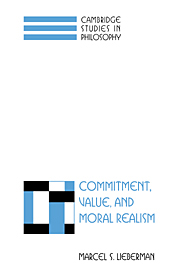
-
Select format
-
- Publisher:
- Cambridge University Press
- Publication date:
- December 2009
- September 1998
- ISBN:
- 9780511583377
- 9780521631112
- 9780521045308
- Dimensions:
- (216 x 138 mm)
- Weight & Pages:
- 0.425kg, 224 Pages
- Dimensions:
- (216 x 138 mm)
- Weight & Pages:
- 0.303kg, 224 Pages
- Subjects:
- Philosophy: General Interest, Ethics, Philosophy
- Series:
- Cambridge Studies in Philosophy
You may already have access via personal or institutional login- Subjects:
- Philosophy: General Interest, Ethics, Philosophy
- Series:
- Cambridge Studies in Philosophy
Book description
Despite the importance of commitment in moral and political philosophy, there has hitherto been little extended analysis of it. Marcel Lieberman examines the conditions under which commitment is possible, and offers at the same time an indirect argument for moral realism. He argues that realist evaluative beliefs are functionally required for commitment - especially regarding its role in self-understanding - and since it is only within a realist framework that such beliefs make sense, realism about values is a condition for the possibility of commitment itself. His ambitious study addresses questions that are of great interest to analytic philosophers but also makes many connections with continental philosophy and with folk psychology, sociology and cognitive science, and will be seen as a distinctive intervention in the debate about moral realism.
Reviews
"In this interesting book, Marcel Liberman develops a novel and sustained argument for moral realism." J.M. Bernstein--The Philosophical Review, Vol.110, No.2 (April 2001)
"Lieberman successfully shows that moral realists are capable of accounting for moral commitment while nonrealists have not yet adequately done so." Ethcis
Contents
Metrics
Full text views
Full text views help Loading metrics...
Loading metrics...
* Views captured on Cambridge Core between #date#. This data will be updated every 24 hours.
Usage data cannot currently be displayed.
Accessibility standard: Unknown
Why this information is here
This section outlines the accessibility features of this content - including support for screen readers, full keyboard navigation and high-contrast display options. This may not be relevant for you.
Accessibility Information
Accessibility compliance for the PDF of this book is currently unknown and may be updated in the future.


